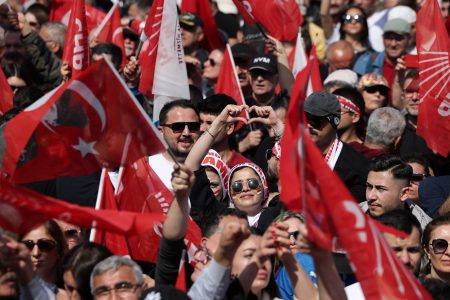The agreement with the troika, the ensuing political confrontation in Parliament with SYRIZA’s motion of censure against the Minister of Finances Yannis Stournaras, the vote for the multi-bill and the hundreds of changes and the congratulatory Eurogroup and Ecofin sessions in Athens that created an air of optimism and certainty for a Greek exit from the financial crisis and isolation from the markets, had created a relevant political climate in the country.
As evident by the double polls by Kapa Research for the European elections, which was conducted for the Sunday edition of To Vima, the rampant optimism in the first part of the study gave New Democracy the necessary push to come two points ahead of SYRIZA.
Specifically, in the first part of the study, which took place on the 1st and 2nd of April, New Democracy rose to 21.7%, SYRIZA retreated to 19.6%, the River remained stable at 9.2%, Golden Dawn dropped to 6.9%, the Communist Party was at 5.8%, the Olive Tree at 5.4%, the Independent Greeks at 3.9%, DIMAR at 2.1%, while 6.5% claimed to vote for other parties, blank voter accounted for 1.8% and 17.1% were undecided.
The Kapa Research study analysts were certain that if this optimism regarding the economy carried on up to the European elections, then the government was certain to achieve a huge victory over its opponents.
That is because it appeared that the overall climate in Greek society was changing, as it was searching and is still searching for hope and to leave behind the misery of the great crisis, five years after the financial catastrophe.
The climate change in the economy, the confirmation of hitting rock bottom, the perspectives of exiting the deep recession influenced and continues to influence the people’s intentions.
A fair few now believe that the Greek people can dream again of a better future. This is a qualitative change with a long-term effect. If this atmosphere of change and the climate of hope are preserved in time, then the voters will act accordingly.
This positive impressions tended to dominate, until Baltakos’ conspiracy and the shock it caused to public opinion were revealed.
Responding to the developments, Kapa Research automatically carried out a second study, in search of the effect of the incident and especially to map the extent of the impact of the secret talks between the former general secretary of the Ministerial Council and Golden Dawn’s second-in-command on public opinion.
The responses indicated to the Kapa’s researchers a change in the intentions of a portion of voters, as a result of the first impressions that dominated after the Baltakos scandal broke out. The political landscape seems to change, at least in the short term, under pressure from the political scandal, depriving New Democracy of the advantage of the positive developments in the economy, which had put it in first place.
Specifically, in the second part of the study New Democracy fell to 20.8%, SYRIZA rose to 21.5%, the River retreated to 8.5%, as it appears that it does not benefit from the polarization, Golden Dawn benefited and rose to 7.7%, KKE also rose to 6.2%, the Olive Tree was affected and dropped to 4.6%, the Independent Greeks slightly improved their share to 4% and DIMAR further dropped to 1.7%.
The affect of the Baltakos scandal appears important and creates the impression that the political system has lots its balance and is stuck in a quick sand environment. As Alekos Papadopoulos says “the political system appears to be at the disposal of a random event”. Perhaps, all of the aforementioned will allow the many opportunists in Greek politics to run wild. And maybe over the next period we will see many more attempts to sway public opinion, with devious means, like the ones used by the neo-Nazis’ second-in-command. The possibility of living through another period of extortion, via wiretapping like with Mavrikis, is anything but unlikely.
However, Kapa Research estimates that the developments in the economy are more critical and crucial.
In the mid-term, they estimate that the effect on public opinion will increase and will likely multiply, provided the financial developments capable of confirming Greece’s exit from the crisis and international isolation are documented quickly enough.
After all, the strength of hope and expectation have always prevailed in politics. After five years of financial catastrophe and personal losses, the Greek society needs, or rather demands, more than ever, a shred of progress and success.
Antonis Karakousis
– Originally published in the Sunday print edition



